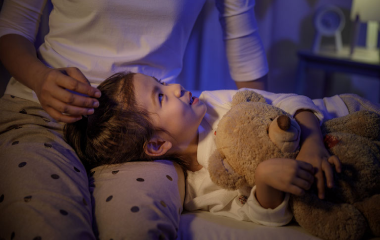The solution to your child’s sleep problems might be a bedtime routine. A study in the journal SLEEP shows that a nightly routine helps young children sleep better.
The study involved 405 children. There were 206 infants between 7 months and 18 months of age, and 199 toddlers between 18 months and 3 years of age. Mothers completed a daily sleep diary that included details of their child’s sleep patterns.
For one week all of the mothers followed their normal bedtime routine with their child. Then for two weeks half of the mothers continued this normal routine. They were the “control group.” The other half of mothers followed a new, three-step routine each night for two weeks.
What was the new routine? The first step was to give their child a bath. The second step was to give a massage to infants or apply lotion to toddlers. The third step was to engage their child in quiet activities. This might involve cuddling or singing a lullaby. Finally, the mothers turned out the lights within 30 minutes of the end of the bath.
This simple, nightly routine made a big difference. Children fell asleep faster, and they had fewer and shorter night wakings. Toddlers were less likely to call out to their parents or get out of their crib or bed.
As a result, children stayed asleep longer. The longest continuous sleep period of infants increased from 6.9 hours to 8.5 hours. For toddlers, it increased from 8.0 hours to 8.9 hours.
The nightly routine also helped the mothers’ mood. It led to improvements in tension, anger, fatigue and confusion.
“There is no question that maternal mood and children’s sleep impact one another,” lead author Jodi Mindell, PhD, told the AASM. “The better a child sleeps and the easier bedtime is, the better a mother’s mood is going to be. In addition, a mom who is not feeling tense, depressed and fatigued is going to be calmer at bedtime, which will help a child settle down to sleep.”
The authors are unsure exactly how this routine helps children sleep. They also were unable to determine if all three of the steps were essential.
It is possible that another consistent, nightly routine could produce similar results. So have you started a bedtime routine with your child?





